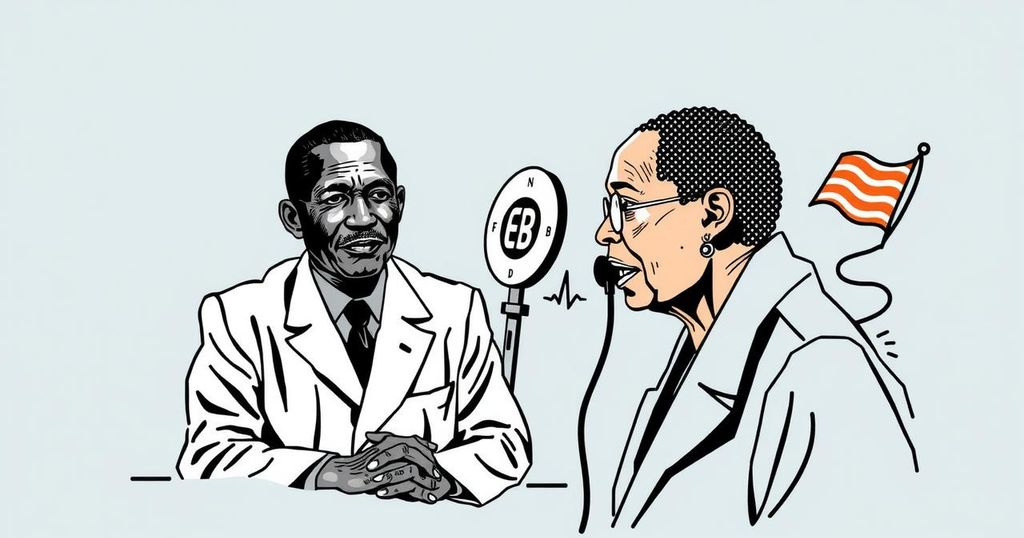The Downfall of Botswana’s Long-Term Ruling Party: An Analysis of the 2023 Elections
In a significant political shift, the Botswana Democratic Party (BDP) was ousted by the Umbrella for Democratic Change (UDC) and its leader, Duma Boko, marking a turning point in Botswana’s electoral history. This change was driven by widespread public dissatisfaction with BDP’s handling of economic issues, particularly its heavy reliance on diamond mining revenue amid falling prices that left over 27 percent of the population unemployed. The UDC’s victory signifies a collective demand for economic diversification and improved living conditions amongst citizens, as highlighted by critical issues such as low minimum wages and inadequate healthcare access.
In a remarkable political shift, the Botswana Democratic Party (BDP), which has held power since the nation’s independence in 1966, has been ousted by the Umbrella for Democratic Change (UDC) and its leader Duma Boko. This electoral change not only symbolizes a significant moment in Botswana’s democratic evolution but also raises pertinent inquiries about the country’s future amidst its ongoing economic struggles and aspirations for a diversified economic landscape. The BDP, one of Africa’s longest-serving political entities, faced mounting public discontent which culminated in the recent elections. The UDC, now a coalition of several opposition factions, acquired 28 out of the 61 parliamentary seats, effectively breaking the BDP’s historical dominance. The vote counting indicated a clear preference among the constituents for opposition parties, with the collaboration of various groups leading to their commanding win. The BDP’s defeat can be attributed to multiple interconnected factors, notably, a decline in global diamond demand, which severely impacted Botswana’s economy. Known as the world’s second-largest natural diamond producer, Botswana relies heavily on diamond revenue, which constitutes over 80 percent of its exports and a quarter of its GDP. In light of plummeting diamond prices, the nation witnessed an escalation in unemployment rates, particularly among the youth, further emphasizing the urgent requirement for economic diversification. This essential pivot was a point of criticism against President Mokgweetsi Masisi’s administration, which struggled to adapt to this imperative change during his campaign. Despite President Masisi acknowledging the necessity for policy reforms during his reelection bid, his assurances failed to resonate with the electorate, as many voters felt that the government had inadequately addressed the pressing economic issues at hand. Political analyst Bongani Malunga underscored the key challenges the BDP faced, stating, “BDF lost power due to a few factors. The first one would be unemployment. There is a high unemployment rate in the country. A lot of the youth are frustrated.” As local sentiments grew increasingly critical of issues like health care accessibility, low minimum wages, and government support for entrepreneurs, the public’s faith in the BDP evaporated. Mr. Duma Boko, leveraging the rising public frustration, articulated a vision of change and leadership that appealed to many disenfranchised voters. As a previous Leader of the Opposition and a key figure in the UDC, he presented himself as a beacon for the imperative reforms Botswana needed. He decisively campaigned on platforms of enhanced job creation, educational investment, and healthcare improvements, which resonated well with the electorate. A day prior to the elections, he underscored the urgency for change with a social media post that proclaimed, “Botswana First.” The results of the election came as a surprise to many analysts, who anticipated a tightly contested race; however, President Masisi openly conceded the party’s miscalculations, stating, “We got it wrong big time in the eyes of the people… there’s no way that I can pretend that we’re going to form a government. I will step aside.” This reflection echoes the broader sentiment that the BDP has not met the expectations of the citizens who entrusted them with power. The UDC’s victory symbolizes a shift towards a new political paradigm in Botswana, one where addressing unemployment and economic diversification is of paramount importance.
The recent electoral defeat of the Botswana Democratic Party (BDP) marks a significant turning point in Botswana’s political history. Established in 1966 following independence from Britain, the BDP has dominated the political landscape for decades. However, mounting public dissatisfaction related to economic issues, particularly the dependence on diamond revenue, has led to a strong opposition force in the Umbrella for Democratic Change (UDC). The impact of global diamond price fluctuations, coupled with high unemployment rates and increasingly vocal critiques of the government’s healthcare responses, culminated in the BDP’s loss. The UDC, led by Duma Boko, gained considerable traction by advocating for diversified economic strategies and job creation.
The BDP’s unexpected electoral loss underscores a significant shift in the political dynamics of Botswana, reflecting widespread public sentiment against an aging ruling party that has been unable to adapt to contemporary economic realities. The newly elected UDC, under Duma Boko, now faces critical challenges in fulfilling its campaign promises of job creation and economic diversification. The electoral results not only highlight the electorate’s desire for change but also serve as a cautionary tale for all political entities regarding the necessity to remain attuned to the needs and aspirations of the populace. As Botswana navigates this new political terrain, the focus will undoubtedly be on how effectively the UDC can translate its commitments into actionable policies that address the pressing issues facing the nation.
Original Source: www.theeastafrican.co.ke




Post Comment